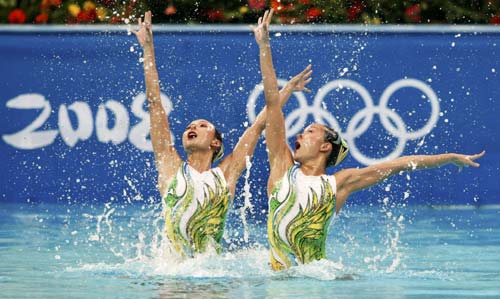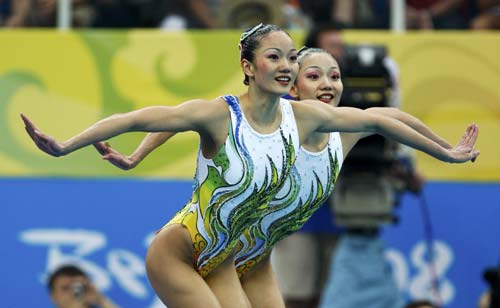BEIJING - The 21-year-old twins share everything: snacks, laughs, gruesome training, and also tears.
 Jiang Tingting and Jiang Wenwen of China perform in the synchronised swimming duet free routine final at the Beijing 2008 Olympic Games August 20, 2008. [Agencies]
Jiang Tingting and Jiang Wenwen of China perform in the synchronised swimming duet free routine final at the Beijing 2008 Olympic Games August 20, 2008. [Agencies] |
Jiang Wenwen and Jiang Tingting, two of China's best synchronized swimmers, failed to take home a highly-anticipated medal in Wednesday's duet competition, won by the Athens champion Anastasia Davydova and Anastasia Ermakova of Russia.
The twins scored 96.334 points, about three full points less than the winners.
"I didn't catch the rhythm, and that caused the problem in our synchronisation," said the younger Tingting, struggling to hold back her tears.
 Jiang Tingting and Jiang Wenwen of China perform at the start of their synchronised swimming duet free routine final at the Beijing 2008 Olympic Games August 20, 2008. [Agencies]
Jiang Tingting and Jiang Wenwen of China perform at the start of their synchronised swimming duet free routine final at the Beijing 2008 Olympic Games August 20, 2008. [Agencies] |
The older sister Wenwen, usually the more silent one, tried to give an assertive tone: "we have competed three times and our performance has improved every time. We are very thankful to our coaches."
Before she could finish the sentence, tears began welling up in her delicate eyes. "We are aware that there is distance between us and the stronger duets. It is a good experience. We still have the team event and we will continue to work hard for that," she said, before hurrying out of the mixed zone.
Slender and tall, the sisters were sent to a local sport club at a young age to increase strength and remedy their lean figure. They started doing synchro swimming as a sport after a synchro coach persuaded them to give it a try.
Synchronized swimming is far from being a popular sport in China, but the sisters came under spotlight when they dethroned longtime Asian champion Japanese swimmers at the 2006 Doha Asian Games. Months later, they made a historical fourth in team and duet competitions in the 2007 Melbourne World Championships.
At an April Olympic qualifier event in Beijing, the twins held off a Japanese duo and won a duet silver.
Mentored by Masayo Imura, a famed Japanese coach, the twins were prepared to improve upon the 7th place from Athens to win a medal at their home Olympics.
They trained nine to 10 hours every day, and had to drop their favourite spicy foods for fearsome amount of cheese and dessert to improve strength.
In their Olympic debut on Monday, the twins marched in unison upon a blue carpet to boisterous cheers of the spectators. Wenwen said the cheers were so loud that they nearly drowned the music.
In Wednesday's final, their free routine was performed to a music piece called "Flying", in which they simulated peacocks and used thin legs to form a square, a unique element that won acclamations in the fully-packed stadium.
Their three-minute performance impressed the crowd, but was only rated 93 percent of their level by coach Imura. "They make an error in the end, and of course there were regrets. We had aimed to win a medal," she said.
"But they are still part of a bigger team and they still have to give it all in the team competition to get a medal," she said.
The team routine is the second medal event in the synchronized swimming discipline. The final is scheduled on Saturday.